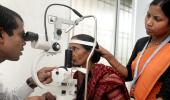With rising incomes, education, and health awareness in India, especially in the big cities, droves of people are saying no to sugar.

Six summers ago, Cadbury, owned by Mondelez, unveiled a campaign for its Dairy Milk chocolate brand to mark its 70th year in India: 'Kuchh achchha ho jaye'. That is Hindi for 'Let something good happen'.
It built on a long-running campaign whose tagline was, 'Kuchh meetha ho jai', or let's have something sweet.
Both the campaigns were rooted in the Indian psyche, where for centuries, sweet has been synonymous with celebration.
Not so much anymore.
Today, achchha (good) is being separated from meetha (sweet).
With rising incomes, education, and health awareness in India, especially in the big cities, droves of people are saying no to sugar.
And the impact is being felt by multinational as well as indigenous brands making beverages, beverage mixes, and confectionaries that have high sugar content.
It is no coincidence that this comes at a time when India, which has had its battles with poverty and malnutrition, is now also facing the rising menace of obesity and lifestyle diseases such as diabetes.
'India faces a severe public health crisis of obesity and diabetes,' stated a report titled The Junk Push, jointly brought out by the Breastfeeding Promotion Network of India and Nutrition Advocacy in Public Interest-India, a think-tank.
In 2023, a group of public health experts, consumers, lawyers, and patient groups had called upon the Government of India to check the soaring consumption of junk food among the country's youth.
On the back foot
Bournvita, which like Dairy Milk is a Mondelez brand, ran into controversy in April last year when social media influencer Revant Himatsingka, who goes by 'Foodpharmer' on Instagram, flagged the sugar content in the it and questioned its position in the market as a 'health drink'.
The product's pack says that it is a cereal-based beverage mix. Its ingredients include extracts of barley, millets, and wheat, along with sugar, cocoa solids, and milk solids, among others.
A few months on, the company reduced added sugars in the product by 14.4 per cent. It has also introduced a variant with 50 per cent less sugar.
The controversy got a new life when the ministry of commerce and industries issued an advisory to e-commerce companies on April 10 to remove drinks and beverages, including Bournvita, from the 'health drinks' category on their portals.
This came after the National Commission for Protection of Child Rights, after an inquiry, concluded that there was no 'health drink' defined under the Food Safety and Standards Act 2006.
The order came days after the Food Safety and Standards Authority of India (FSSAI) advised e-commerce platforms to ensure that dairy-, cereal-, and malt-based beverage mixes were not available under the 'health drinks' or 'energy drinks' category.
The Bournvita chatter was still going on when Swiss NGO Public Eye alleged that Nestlé, the Swiss multinational, was adding sugar and honey to its infant milk and cereal range sold in low- and middle-income countries.
Nestlé India said the formulation of infant food products like Cerelac was done on the basis of global norms and sugars added to the product were within the limits set by the law and FSSAI.
'Every formulation of the company is done on a global basis. There is no local approach to making a nutritional adequacy study, it is done globally,' said Suresh Narayanan, chairman and managing director, Nestlé India.
Earlier, a Nestlé India spokesperson had said in a statement: 'Reduction of added sugars is a priority for Nestlé India. Over the past five years, we have already reduced added sugars by up to 30 per cent, depending on the variant.'
A few days ago, Hindustan Unilever renamed its 'health food drinks' to 'functional nutritional drinks', putting popular brands such as Horlicks and Boost under the new category.
Mondelez, Nestle, HUL and others will find empathy with their fellow multinationals such as Coca-Cola and Pepsi, both of which have been feeling the rise of health-consciousness and have been trying for years to develop categories other than sugary soft drinks.
Most notably, Indra Nooyi who was the CEO of PepsiCo for 12 years until 2018, took the company into snacks and food items, two of the highlights being oatmeal and sports drink.
It is not just the multinationals. If you hear the chatter on traditional media as well as social media, doctors, advisors, and influencers are warning people about the ill effects of sugar, and foods and drinks filled with sugar, including packaged juices.
These are areas where several Indian companies have a large presence.
Anecdotally, fitness-conscious, headphone-wearing young folks in India's big cities are shunning the three so-called white poisons in the kitchen: Salt, maida, and -- of course -- sugar.
Policy perspective
The recommended sugar intake is 20 grams a day for adults and 25 grams a day for those below 18.
Not more than 5 to 10 per cent of a person's total energy intake should come from sugar.
However, this limit is often breached because people tend to consume packaged foods.
Children under two are not supposed to consume any added sugar, "which is why the allegation about Nestlé adding sugar to Cerelac is so concerning," says Manoli Mehta, a Dubai-based nutritionist and clinical dietician who also consults in Mumbai.
"It is important that people are educated about reading labels on food packets."
She adds that front-of-the-pack nutrition labelling can be a boon.
Arun Gupta, a paediatrician and convenor, Nutrition Advocacy in Public Interest India, a think-tank, says policy intervention is needed.
"Sugar is a worldwide problem and India is a huge market for global food products and hence becomes a target," he says.
"A lack of comprehensive legal framework prevents action against such products containing high doses of sugar.
"The underlying problem is not the sugar content but the classification of products as healthy or unhealthy; the labeling of these products in that manner; and their advertisement, which should be on the basis of their contents."
FSSAI is currently considering the introduction of front-of-the-pack nutrition labelling and is looking at the recommendations by companies and industry bodies, according to a person in the know.
It has received more than 10,000 recommendations.
Two other persons privy to the developments say the government does not want to depend on the Western countries for guidance on dietary recommendations for Indians as the requirements here differ.
In September 2022, following discussions with stakeholders, the food regulatory authority had proposed an Indian Nutrition Rating, a star rating system that would assess the overall nutrition profile of a packaged food item and assign it a rating of anything from half a star to five.
Maybe we will one day hear a campaign that would say: Kuchh stars ho jaye (Let there be a few stars).
Feature Presentation: Ashish Narsale/Rediff.com











